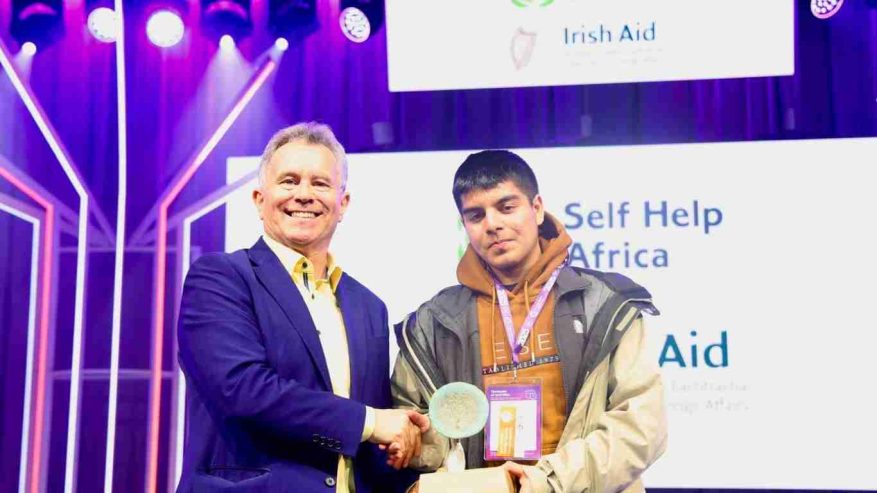An inexpensive, non-invasive tool that uses a smartphone camera to diagnose anaemia has been awarded as the winner of Self Help Africa and Irish Aid’s Science for Development Award at the 2025 BT Young Scientist and Technology Exhibition in Dublin.
Student Anaus Syed Muhammad from Bruce Collge, Cork, won first place with his project ‘HemaSense: Screens for anaemia, blood conditions without needle sticks’.
With more than 1.6 billion people worldwide suffering from anaemia (World Health Organisation), whereby the hemoglobin concentration in red blood cells is lower than normal. To measure for this, blood must be drawn with a needle or intravenous line, or via an expensive non-invasive specialised machine. Anaus’ project solves this problem, with an affordable and accessible anaemia screening solution, all with a smartphone camera.
Anaus received his prize from Minister of State at the Department of Foreign Affairs, Seán Fleming TD, and will also receive an Irish Aid-funded travel bursary which will enable him to travel with his teacher on a study visit with Self Help Africa to a country where we work.
Minister Fleming said: “Science and technology has the potential to tackle major issues facing people across the world. The Science for Development Award encourages young people to use their curiosity and talent to develop projects with the potential to improve people’s lives and make the world a better place.”
In addition, Anaus was awarded the perpetual bronze and aluminium perpetual trophy, which was created from recycled metals, designed by 16-year-old Rathfarnham Beaufort art student Noemi Karska.
The 2025 BT Young Scientist and Technology exhibition was a milestone event too, marking 20 years of the Self Help Africa and Irish Aid Science for Development Award. The prize is presented by the BTYSTE adjudicators each year to a project with the most promising potential to improve lives within the context of international development. Past winners of the Science for Development Award have devised scientific solutions including banana skin bandages, fuel-efficient cook stoves, developed methods of purifying water and preserving food, and have addressed social issues including race, religion and female menstrual health.
Another significant milestone was marked at the BT Young Scientist this year as the Tánaiste signed a Memorandum of Understanding (MoU) with Professor Pat Guiry, Chair of the Young Scientist & Technology Exhibition. The MoU will support Ireland’s Embassies and the BT YSTE in the development of further International YSTE competitions, such as those already established by Ireland’s Embassies in Kenya and Jordan. This will contribute to Ireland’s ongoing work in the area of education and encourage young people, particularly girls, to study science, technology, engineering and mathematics (STEM).

